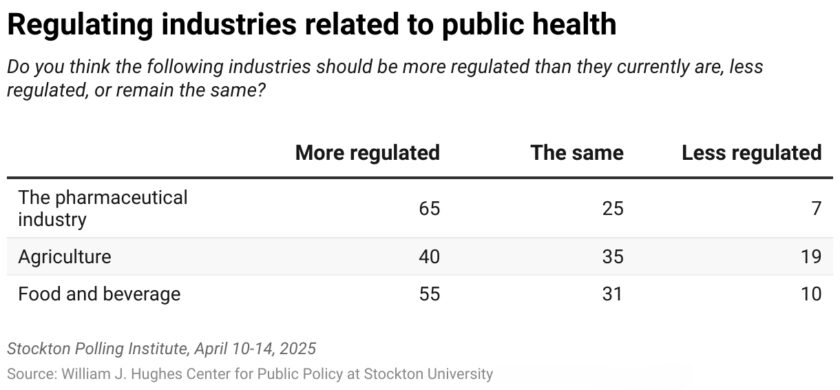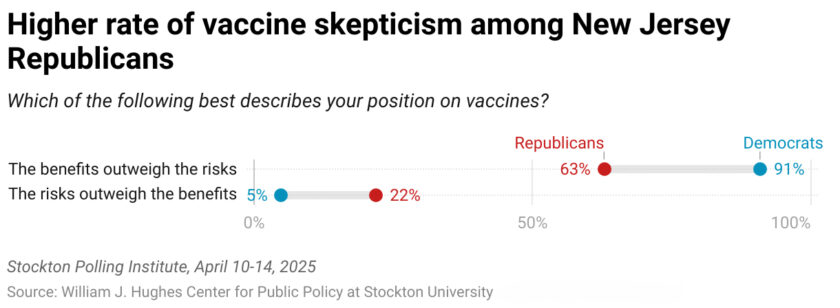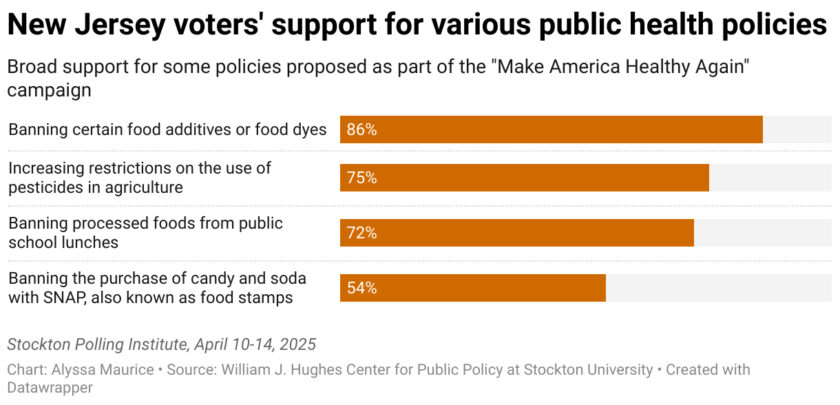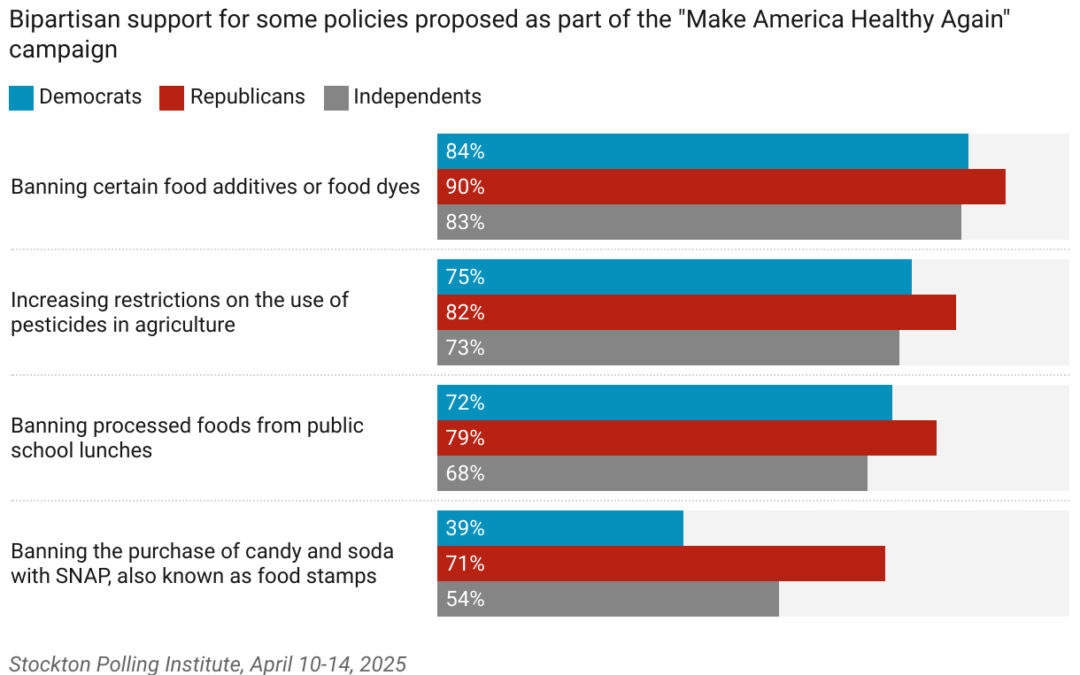Trust in federal health agencies falls along partisan lines, but both sides of the aisle want increased restrictions on food additives, processed foods and pesticides, according to a poll of New Jersey voters released today by the William J. Hughes Center for Public Policy at Stockton University.
Democrats and Republicans are in lockstep with some of the more mainstream proposals associated with the “Make America Healthy Again” campaign, or MAHA, spearheaded by U.S. Department of Health and Human Services Secretary Robert F. Kennedy Jr.
However, there were partisan differences on vaccines. Though majorities on both sides think childhood vaccinations are important and a net benefit, more than 1 in 5 Republicans think the risks of vaccines outweigh the benefits, compared to only 5% of Democrats who said the same.
“The MAHA movement is a sprawling umbrella that merges false or debunked claims, controversial rhetoric and anti-establishment sentiment with some more widely accepted ideas around food, health and wellness,” said Hughes Center Head of Research Alyssa Maurice. “It doesn’t fit neatly into an ideological box, and we’re seeing that in these poll results, which are surprisingly unifying on some measures.”
The poll of 667 registered voters in New Jersey was conducted April 10-14 and has a margin of error of +/- 3.8 percentage points.

Public health policy
Majorities of New Jersey voters want more stringent regulations around pharmaceuticals (65%) and the food and beverage industry (55%). A plurality of 40% also want agriculture to be more heavily regulated.
Voters support some of the policies championed by Kennedy, like banning certain food additives or food dyes (86%), increasing restrictions on the use of pesticides in agriculture (75%), banning processed foods from public school lunches (72%; among parents of school-age children, 80%) and banning the purchase of candy and soda with SNAP benefits, also known as food stamps (54%).
All of these proposals had bipartisan support except for restrictions on SNAP purchases, which 54% of Democrats opposed.
“Many of these agenda items were previously associated with the left and run counter to the Trump administration’s deregulatory approach to policymaking,” Maurice said. “Blue states like California led the way on food safety and other legislation meant to improve public health, but we’re now seeing similar bills emerge in Republican legislatures throughout the country. An unconventional coalition has formed on this, and New Jersey’s no exception.”

Vaccine confidence
Seventy-one percent of voters said it is very important for children to get vaccinated (93% of Democrats, 54% of Republicans and 63% of Independents), while 18% said it is somewhat important (4% of Democrats, 32% of Republicans, and 23% of Independents). A minority of 7% said it is not too important or not at all important for kids to get vaccinated (2% of Democrats, 10% of Republicans, and 11% of Independents).
Consistent with existing data, vaccines have become increasingly partisan. Democrats have the lowest rate of vaccine hesitancy. More than 1 in 5 Republicans said the risks of immunizations outweigh the benefits. That rate was 15% among Independents and only 5% among Democrats.
Trust in federal health agencies
More than one-third (35%) of voters overall have no confidence in the federal government to ensure the safety of the food supply in the U.S., while 27% are not too confident, 26% are somewhat confident, and 12% are very confident.
The findings were similar when it comes to ensuring the safety of medical and pharmaceutical treatments, with a plurality of 37% saying they are not at all confident in the federal government to do so. One in four voters is not too confident, 26% are somewhat confident, and only 10% are very confident.
These views fall along partisan lines, with Republicans showing support for federal public health agencies under their current leadership. Majorities of Republicans are at least somewhat confident in the safety of the food supply (70%), as well as medical and pharmaceutical treatments (68%), but among Democrats, confidence rates are 21% and 27%, respectively. Independents land in the middle with confidence rates of 34% in the U.S. food supply and 31% in the government’s oversight of the medical and pharmaceutical industries.
“The findings show how politically polarizing federal health agencies have become. We see in public opinion on the economy that voters are happier with economic conditions when their party is in charge. In this poll, we’re seeing that same pattern with public health authorities,” Maurice said.

Methodology
The poll of New Jersey registered voters was sponsored and conducted by the Stockton Polling Institute of the William J. Hughes Center for Public Policy at Stockton University. Data collection took place from April 10-14, 2025. A total of 667 New Jersey voters were interviewed. Responses were recorded via telephone or online in English.
Overall, 94% of interviews were conducted on cell phones and 6% on landline phones. In terms of mode, 60% were reached via dialing with the survey administered by a live interviewer and 40% were reached via text-to-web. The live calls were conducted by Opinion Services. The text messages were sent by Stockton Polling Institute staff from the University’s Galloway campus and included a single-use link to take the survey online.
All respondents passed various quality control checks to evaluate the quality of the data collected online. Both cell and landline samples consisted of random digit dialing (RDD) and voter list sample from MSG. Both listed and unlisted numbers are included. Within-household selection is done by asking for the youngest adult. Adults without a telephone are excluded from the sample. The data was weighted to balance the sample demographics using iterative proportional fitting, also known as raking or random iterative method (RIM) weighting. Weights were based on U.S. Census Bureau ACS 2023 data for the citizen voting age population in New Jersey on variables of age, race, education level, and sex. The poll’s margin of error is +/- 3.8 percentage points at a 95% confidence level. The margin of sampling error is higher for subsets. Sampling error does not account for other potential sources of bias in polls such as measurement error or nonresponse.
About the Hughes Center
The William J. Hughes Center for Public Policy at Stockton University serves as a catalyst for research, analysis and innovative policy solutions on the economic, social and cultural issues facing New Jersey, and promotes civic life through engagement, education, and research. The nonpartisan center is named for the late William J. Hughes, whose distinguished career includes service in the U.S. House of Representatives, Ambassador to Panama, and as a Distinguished Visiting Professor at Stockton. The Hughes Public Policy Center can be found on YouTube @StocktonPublicPolicyCenter, and can be followed on Instagram @hughespublicpolicycenter, Facebook @StocktonHughesCenter, and X@HughesCenter.















